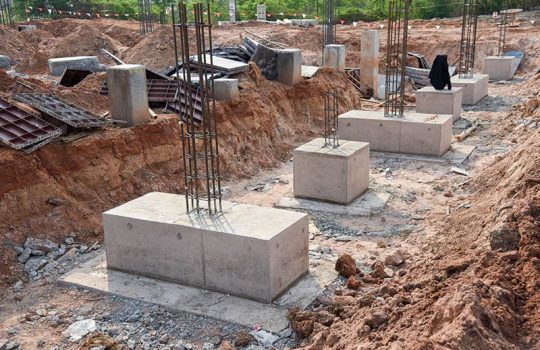Services Concrete Foundations Concrete Foundations London
Foundation building is a significant step in the overall construction process of any infrastructure. Without strong and reliable foundations, the superstructure will always be at risk. Foundations are of numerous types, but the basic categorisation includes deep foundations and shallow foundations.
Deep foundations are built when the surface soil does not have the right qualities to support construction. Therefore, deeper and better-quality soil layers have to be used for construction. This is achieved either by excavating or other techniques. Shallow foundations are built when the surface soil can easily support the superstructure. Reinforced concrete can be used for building both shallow and deep foundations. Shallow foundations built from concrete include pad foundations, raft foundations, and footings. Deep concrete foundations include concrete columns, caissons, and driven piles such as steel. Our Concrete Foundations London builders can build deep and shallow concrete foundations for commercial and residential projects.
A concrete slab foundation is simply a heavy and strong slab of concrete used to create flat surfaces such as ceilings and floors of buildings. Three basic types of concrete slab foundations are T-shaped, Frost protected, and slab-on-grade. T-shaped slabs provide a secure footing and are usually wide. They are used for supporting high and big buildings.
Our expert team are always on hand to offer advice and recommendations for your construction project. Get in touch today for a free no obligation quote or give us a call on 01376 311 252.
They can protect the foundations from the frozen ground. Slab-on-grade foundations are used in areas which do not freeze. They are less expensive than T-shaped foundations and are mostly used for creating integral footing to secure the edges of a base. Frost-protected slabs use polystyrene coverings laid on a layer of gravel before the slabs are cascaded. They are used to prevent the ground surrounding the footings from freezing. Our skilled engineers will decide which type of slabs are suitable for your construction project.
A concrete raft foundation is one of the most common concrete foundation systems. It looks like a raft with thick steel-reinforced concrete slabs resting on the soil. Supporting walls or columns are used for transferring the load to the soil. These foundations usually spread throughout the area of the superstructure they are supporting. They are mostly used for large-size commercial and industrial projects. Our qualified civil engineers and our concrete foundation contractors in London can design and build the perfect raft foundations for your buildings.
A concrete pad foundation is a type of a “spread foundation”. The pads are usually circular, square, or rectangular in shape. They provide localised support for structures such as columns, framed structures, and groups of columns. The load of the supported structure spreads to more resistant soil layers through the pads. The types of pad foundations include reinforced concrete, combined column foundations, continuous pad, and ground beams. Our construction team specialises in building all types of foundations. When you hire us, you can be sure that your structures will be built on reliable foundations.

Concrete blocks foundations are simply foundations built from concrete blocks. They are also known as CMUs (Cinder Masonry Units) and are very common. Mortar is used to coat the footings, and CMUs are laid on top to form a uniform layer. As CMUs are hollow, these foundations are reinforced with rebar, while concrete is used to fill the surrounding gaps. Smaller structures, such as garden walls, may not require rebar. However, reinforcement is required when the foundations have to support large structures.
The first step in identifying the right type of foundation for a project is to analyse the soil quality thoroughly. Our geotechnical engineers will calculate the LBV of the soil. The LBV gives an idea of the load-bearing capacity of the soil. Low LBV compels the engineers to find deeper and better layers. The reaction of soil to climatic changes is also studied to see how the soil’s moisture content will behave. Soil layers can shrink or expand, compromising the structure above. Adjacent structures such as trees and buildings can also get affected, and in some areas, certain types of foundations may be regulated by the relevant authorities. All these factors and many more need to be considered to identify the most suitable foundations. You need not worry about any of these because this is the job of our engineers. Contact our concrete block foundation builders in London if you are planning the construction of a project, and we will provide you with reliable and effective services.
Rayne, Braintree, CM77 6SR
Rayne, Braintree, CM77 6SR